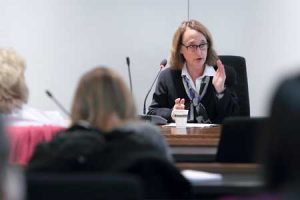
VP (Research and International Relations) sets bar high for researchers
By Neale McDevitt
In the first of what will be a series of open forums, Rosie Goldstein, McGill’s new VP (Research and International Relations), pledged to “create a consultative mood” to better serve her constituents. “My main concern is how can I best support you – students, staff, faculty – to do research,” she said. “What do you need to be your most successful?”
Goldstein made the remarks to open the research Town Hall on Jan. 20. The event was held in Leacock 232 and was attended by some 50 people.
Only two months into her job, Goldstein made no pretensions about her role in the coming months. “I’m mostly here to listen,” she said, “and find out how my office can best serve you.”
In her introductory remarks, Goldstein, herself a researcher with McGill roots (she earned a BSc in cell and molecular biology here in ’75, followed by a medical degree in ’79), spoke of the potential effects of the work being done at the University. “We really have the potential to help transform society… to really help solve the most difficult human problems,” she said. “It is a heavy responsibility because there aren’t too many places that can do this.”
Goldstein took the opportunity to outline some of her key priorities in the coming year. Top on Goldstein’s To Do list is refreshing the strategic research plan by “articulating McGill’s highest research priorities, with an emphasis on [the University’s] international research strategy, as well as strategies for commercialization and building relationships with industry.”
Asked to elaborate on why and how McGill will emphasize collaborations with industry, Goldstein said it comes from the demands of a changing world. “I am very much a traditionalist – I believe in the excellent basic research that we do here and I will support that,” she said. “But I also believe we have a responsibility… to transfer our new knowledge and discoveries [for use] in the real world.
“This is a tremendous opportunity for [McGill] to partner with industry and … make our research discoveries more applicable to society,” she said.
While much of the discussion revolved around research, Goldstein also stressed the importance of making that research part of the educational experience at McGill. “We need to look at how much our best researchers are in the classroom and how much of that research is part of the curriculum,” she said. “Students are asking ‘why should I chose McGill?’ and research should enrich their education. [It should be one reason] why students come here and why they stay.”
On the subject of funding, or specifically, the cuts in funding for research centres like McGill’s Centre for Intelligent Machines, Goldstein made it clear on which side of the debate she stands. “Certainly part of my plan is to increase our funding at the provincial level,” she said. “I strongly believe that McGill understands that in lean economic times, you still have to make investments – you just have to make them more judiciously. This is not the right time to cut back because this is our future.”
